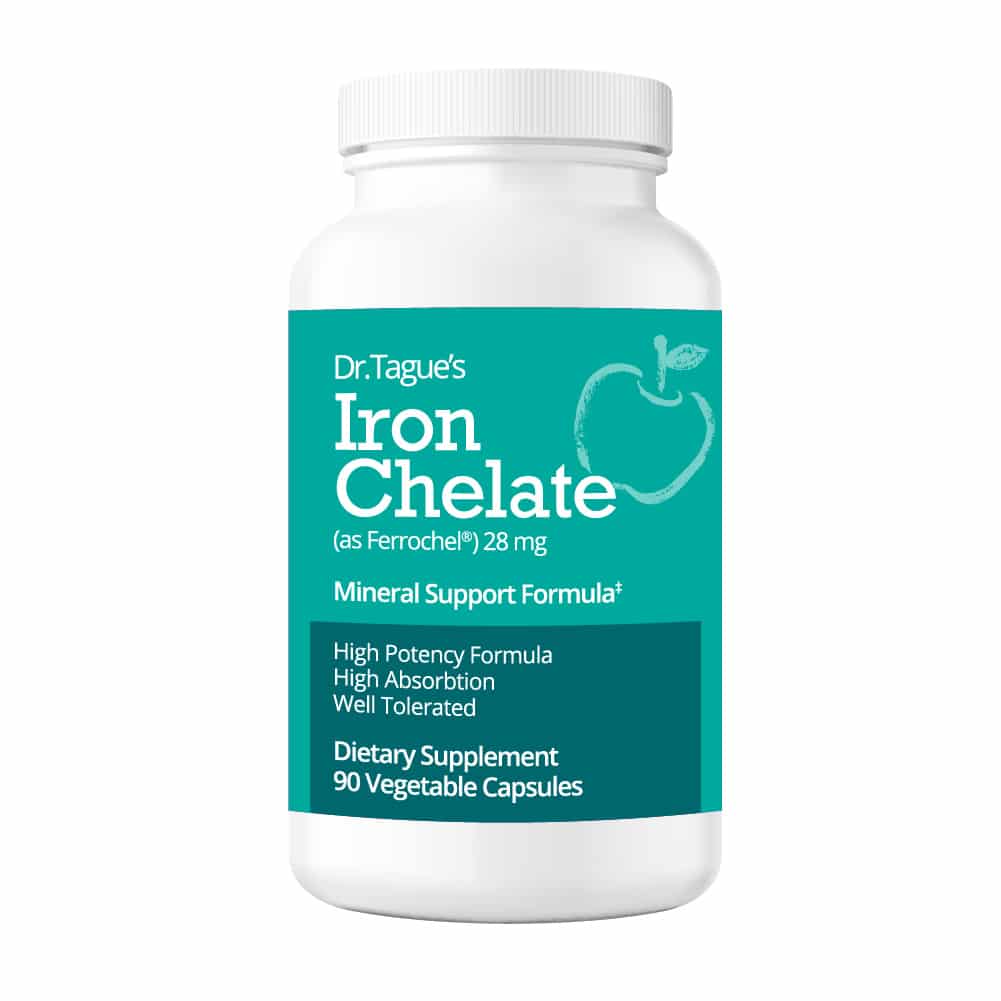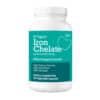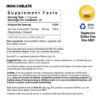Iron Chelate at a glance*
- Essential to carry oxygen in the blood to every cell in the body
- Supports metabolism
- Supports improved absorption and effectiveness
- Supports muscle function
- Helps build body protein
Iron Chelate
Iron deficiency is the most common nutritional deficiency in the world. Iron levels even in the lower end of normal can result in unexplained fatigue, impaired learning, memory problems, depression, and poor physical performance. The most critical age for adequate iron intake is up to age 20 – the brain develops until age 20 and requires iron for proper growth and function.
Functions of Iron
- Essential to carry oxygen in the blood to every cell in the body
- Helps cells in the body grow and develop normally
- Assists in the metabolism
- Helps build body protein
- Prevents anemia (thinning of the blood)
Iron Deficiency Anemia
Iron Deficiency Anemia is the most common and widespread nutritional disorder in the world. Over 30% of the world’s population is anemic – more commonly seen in women than men.
Symptoms of Iron Deficiency
Fatigue, lethargy, abnormal appetite, cravings, depression, and shortness of breath with activity…. even mild iron deficiency can cause fatigue and impair physical activity because the muscle tissue lacks adequate oxygen when iron is low. Low iron levels may result from an iron poor diet, excessive bleeding, donating blood, as well as stomach and intestinal problems or just from normal or heavy menses. Drugs that reduce stomach acid (PPI’s or antacids) may make it difficult for your body to absorb iron. Most of the body’s iron stores are contained within two proteins:
Hemoglobin – An iron-rich protein that delivers oxygen to tissues in the blood 2/3rds of iron in the body is within hemoglobin
Myoglobin – An iron-rich oxygen storage protein in muscle cells
Absorption
Iron absorption in the human body is highly regulated because we lack a way to excrete excess iron and too much can be toxic. Your body knows if you need more iron and will absorb more when you need more, less when you need less. Iron absorption is also very affected by the form of iron. Iron in red meats is absorbed around 20%. The absorption of iron in plant foods is around 10%.
As far as supplements go, iron amino acid chelate has many advantages over less expensive versions of iron such as ferrous sulfate, ferrous fumarate and ferrous gluconate. Iron amino acid chelate ranks higher in bioavailability (it ability to give benefits) and is better tolerated compared to other sources of iron.
For example, a dose of 30 mg iron/day as iron amino acid chelate was found to be as effective as 120 mg of ferrous sulfate (the most common over the counter version of iron).
Advantages of Iron Amino Acid Chelate:
- Improved absorption and effect
- Compatible with other nutrients
- Lower intestinal side effects like constipation
Research suggests Iron Chelate may support health in the following ways:*
- Essential to carry oxygen in the blood to every cell in the body.
- Assists in metabolism.
- Iron Chelate has benefits of improved absorption and effectiveness.
- Beneficial for muscle function.
- Iron helps build body protein.
Dietary Factors That Influence Iron Absorption:
- Enhance absorption: vitamin C, meat, citric acid.
- Inhibit: antacids, tea & coffee, spinach, soy protein, calcium.
Where Iron is found in the Diet:
The best sources of iron in the diet are from red meats, shellfish, poultry and fish. These types of foods provide heme iron that allows for the greater absorption of iron. Other good sources of iron are dark leafy greens, beans, lentils, chickpeas, soybeans and iron enriched cereals and grains.
Dosage Recommendations
Suggested Usage: As a dietary supplement, adults take 1 capsule daily with food, or as directed by your healthcare professional. Dosages should be based on serum ferritin levels in the blood. Serum ferritin reflects the amount of total iron stored in the body. Not intended for children.
Precautions & Safety
Accidental overdose of iron-containing products is a leading cause of fatal poisoning in children under age. KEEP OUT OF REACH OF CHILDREN. In case of accidental overdose, call a doctor or poison control center immediately.
Iron supplementation should never be initiated without blood tests first! If iron status is below optimal and supplementation is warranted, iron status should always be monitored as iron overload presents serious health consequences. Too much iron will create excesses stored in the liver, bone marrow and spleen. This excess iron increases the risk for liver cancer, cardiovascular disease and type 2 diabetes in postmenopausal women.
Quality Concerns of Iron Supplements: Choose a quality supplement. The most common contaminant in iron is lead. In 1997 the FDA recalled several iron-containing supplements because of excessive levels of lead.
Note for Athletes/Intense Exercisers: Optimum iron absorption occurs when iron supplementation is taken 30 minutes before exercise, this way it is absorbed 5 times better than when at rest!
J Ntr, vol 141, 2011, Pediatr Neurol, vol 38, 2008 Am J Clin Nutr, suppl, 2005, Bruner, Lancet 1996 J Am Coll Nutr, vol 17, 1999






